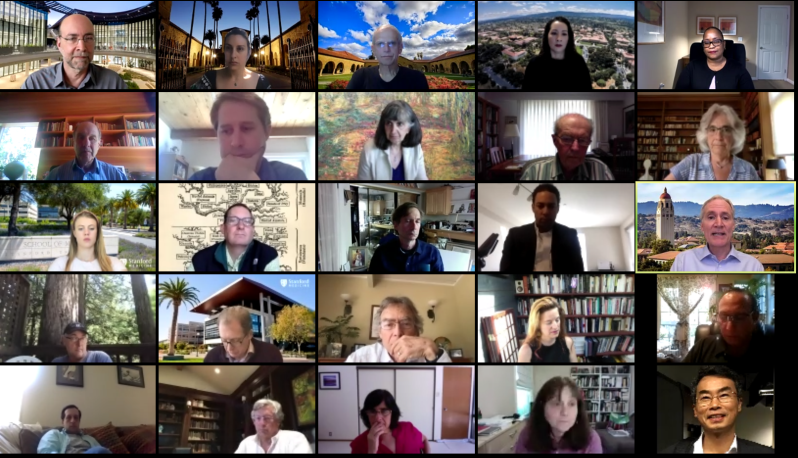On Thursday, the Faculty Senate passed both the “Future of the Major” proposal, which will require all majors to consist of between 60 and 100 units, and the proposal for a “First-Year Experience,” which will involve a two-course requirement in civic, liberal and global education. Both proposals will be effective as of fall 2021.
The changes to majors are intended to “address goals of accessibility,” according to Graduate School of Education professor Adam Banks, who introduced both the proposals on behalf of the Committee on Undergraduate Standards and Policy (C-USP). In addition to setting a cap on units, the Future of the Major motion includes a requirement that all majors include a capstone project.
The proposal raised worries among engineering faculty, who expressed concern about how unit limits would affect student skills and preparedness for entering the workplace.
Electrical engineering professor Andrea Goldsmith expressed worries about a lighter curriculum leaving students inadequately prepared to work in industry, saying the changes could “turn Stanford Engineering into engineering lite and hurt our reputation.”
Other faculty members, however, welcomed the changes.
Aron Rodrigue, a history professor and Bing Overseas Studies Program director, said the proposal would make it easier for students to go abroad.
Although Earth Systems is one of the highest-unit majors at 132 units, Dean of the School of Earth, Energy, & Environmental Sciences Stephan Graham said the department was “quite confident they could make these adjustments.”
Others said that limiting the range of units among majors doesn’t actually solve the problem of accessibility for first-generation and/or low-income (FLI) students.
Discussing gaps in resources for FLI students like fewer opportunities to take Advanced Placement courses before coming to Stanford, mechanical engineering professor Juan Santiago said the “way to fix that is not with the stroke of a pen from a centralized office … We need to support them with time and money.”
The Future of the Major changes will remain effective for six years, starting in the 2021-22 academic year, after which they will be subject to additional assessment and review.
Meanwhile, the First-Year Experience changes will implement a first-year shared curriculum involving a four-year pilot of “innovation and experimentation.” The proposal passed with an amendment that “all courses should earn at least three units of credit with at least two hours in small-group discussion.”
Banks said that Thinking Matters courses could be adapted to fit the new curriculum.
Dan Edelstein, French professor and director of Stanford Introductory Studies (SIS), which manages required and elective academic programs for first- and second-year students, said that courses in the new curriculum would count towards Ways requirements and would not increase the overall unit requirement for students.
Many faculty members praised the benefits that a shared first-year experience would bring and the space it would provide for students to explore a liberal arts education.
Vice Provost for Undergraduate Education Harry Elam said the core curriculum is an opportunity for Stanford to “do something it has never done before.” Citing frequent changes in first-year requirements, with discontinued programs like Western Civilization and Introduction to Humanities yielding to what is now Thinking Matters, Elam said that the curriculum has “the chance to be something that lasts.”
This proposal, though, prompted concerns about whether the University had the necessary budget, in the midst of the financial pressure resulting from the COVID-19 pandemic, for the program to be successful.
Provost Persis Drell responded, “As for next year, I’m not going to back away from ‘We have some difficult times to come,’ but I actually think it is imperative for the institution to prioritize the things that are important to the institution.”
“I believe we have resources at this institution that can support this program,” Drell said. “I think it is really important for our whole educational arc of our students to start them in this way, so I will welcome the challenge to find the resources.”
Associated Students of Stanford University (ASSU) President Erica Scott ’20 shared concerns about the amount of student input in both proposals. In a survey of over 200 students by the Student Alliance for Justice Education (SAJE), 78% and 80% felt like they did not have an opportunity to have input into the First-Year Experience and the Future of the Major respectively. SAJE called for “more robust community outreach and mechanisms.”
Banks responded that C-USP has taken SAJE’s suggestion and input very seriously.
“I individually met with SAJE, and I made sure that a statement they prepared about the kinds of engagement they wanted in these initiatives was both shared with C-USP and discussed by C-USP,” Banks said.
About plans for the coming academic year, President Marc Tessier-Lavigne said that the University still “aims” to make a decision regarding fall quarter “sometime in June.” He also confirmed that construction activities, including construction on the Escondido Village Graduate Residences (EVGR), will resume, with the project still on track to be completed by August.
Drell commended the virtual Admit Weekend Day for the class of 2024, saying the University “achieved a very strong yield for the entering class.”
Regarding new Title IX rules released by the Department of Education yesterday, Drell said the University “will need some time to complete a thorough review and get legal clarity.”
“However the federal regulations might affect Stanford, we will continue, and I am committed, in our efforts to ensure that our campus is safe and a respectful environment to live, work, and study,” Drell said.
Contact Esha Dhawan at edhawan ‘at’ stanford.edu.
